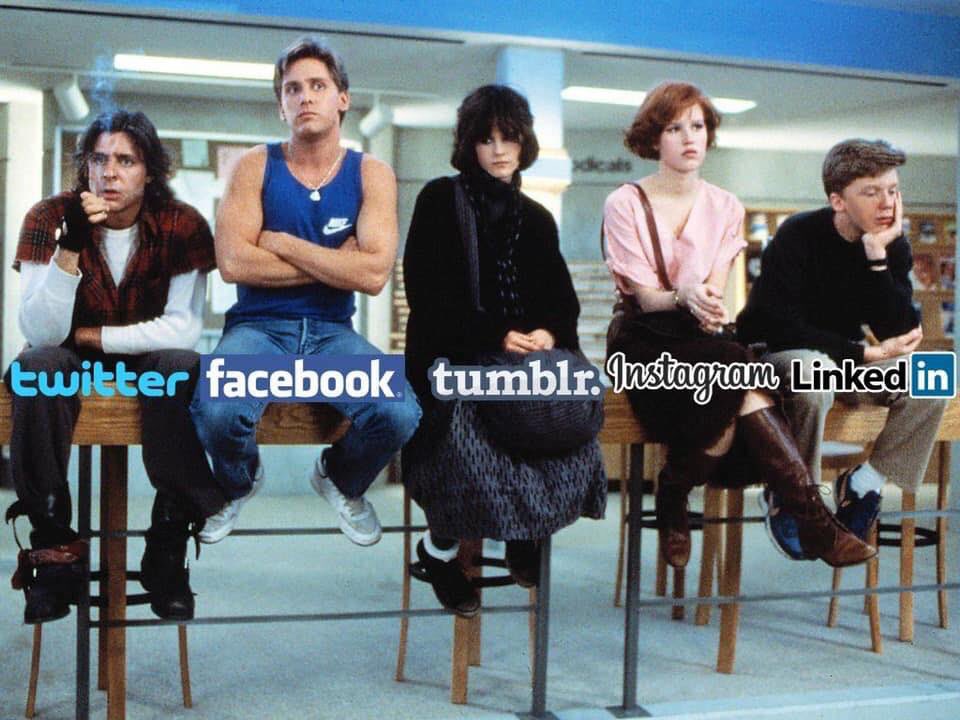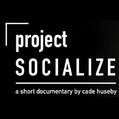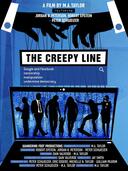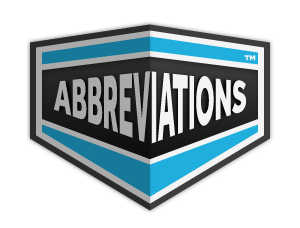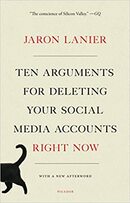Social Media
"If you don't pay for the product, you are the product.'"
-blue_beetle
|
Social media are interactive computer-mediated technologies that facilitate the creation or sharing of information, ideas, career interests, and other forms of expression via virtual communities and networks. The variety of stand-alone and built-in social media services currently available introduces challenges of definition; however, there are some common features:
https://en.wikipedia.org/wiki/Social_media |
Social Media |
Hashtags
What is the purpose of a hashtag

Think of hashtags as a way to connect social media content to a specific topic, event, theme or conversation. They also make it easier to discover posts around those specific topics, because hashtags aggregate all social media content with that same hashtag.Apr 15, 2020
How to Use Hashtags: A Quick and Simple Guide for Every ...
How to Use Hashtags: A Quick and Simple Guide for Every ...
How to Use Hashtags on Twitter, Facebook & Instagram
|
How To Use Hashtags Effectively In Social Media Marketing?Hashtags (#) are specific and unique keywords that make your content more discoverable on social media platforms and help you to engage with other social media users based on a common theme or interest. Clicking on any hashtag directs you to every social media post using the same hashtag.
|
Overview
|
By design, social media is Internet-based and gives users quick electronic communication of content. Content includes personal information, ...
Biz Stone on Social Innovation | American GeniusThe co-founder of Twitter discusses what it's like to discover you have created a tool that can be a vehicle for true social movement.
Social Media in Plain English
A simple story that illustrates the forces shaping social media. This video is a metaphor-rich explanation of Social Media. It tells of a town that changes as a result of democratization. It teaches: • Social Media's role in giving people the power to produce video, music, etc. on the web • How social media compares to traditional media • How fans play a role in deciding what should be findable and popular • The benefits of social media to individuals and organizations Need explainer videos for your classroom? This video is a sample from a unique video library that can be licensed for use by educators. http://CommonCraft.com/ Ready-made Videos and Downloadable Visuals for Educators
Social Media: Crash Course Navigating Digital Information #10
Today, in our series finale, we're going to talk about the great white whale of navigating online information: your social media feed. Social media shapes both our online and offline behaviors from how we engage in communities and consume goods and services to influencing our thoughts and opinions. So let's talk about how they really function - the good stuff and also the terrible stuff. We know that navigating our current information environment can be frustrating, and we hope this series has helped you develop the habits to navigate our digital world a bit more confidently. Thanks so much for watching!
|
The History of Social Media
Share your mouse and keyboard between multiple computers with Synergy 2! Save 50% here: https://symless.com/synergy/tq11
Yes, and even past the first recognized social media site "Six Degrees", founded in 1997 by Andrew Weinreich. Social media dates back as far as ...
Oct 14, 2019 — Social media history. Many experts in the marketing industry credit the creation of social media to the rise of communication technology. In 1844, ...
The first 'social network'. Social media has been evolving since the invention of the Internet. From the first email in 1971 and Usenet in 1979 to ...
Most Popular Social Media Platforms 1997 - 2020
In this data visualization video I look at the most popular social media networks based on active accounts during that time. I also did not include streaming video platforms such as YouTube and Twitch, I will post those in a different video.
If you're looking for the site with the most users, Facebook, YouTube, and WhatsApp are likely the best social media options. Those that want to ...
Most Popular:Some of the most popular social media websites, with over 100 million registered users, include Facebook (and its associated Facebook Messenger), TikTok, WeChat, Instagram, QZone, Weibo, Twitter, Tumblr, Baidu Tieba and LinkedIn. Other popular platforms that are sometimes referred to as social media services (differing on interpretation) include YouTube, QQ, Quora, Telegram, WhatsApp, LINE, Snapchat, Pinterest, Viber, Reddit, Discord, VK, Microsoft Teams, and more.
https://en.wikipedia.org/wiki/Social_media |
Social Media Documentaries
The Social DilemmaDiscover what’s hiding on the other side of your screen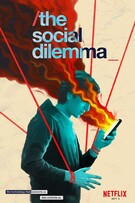
The world has long recognized the positive applications of social media, from its role in empowering protesters to speak out against oppression during the Arab Spring uprisings almost a decade ago, to serving an instrumental role in fighting for equity and justice today. And in 2020, during an astonishing global pandemic, social media has become our lifeline to stay in touch with loved ones, as well as proving to be an asset for mobilizing civil rights protests. However, the system that connects us also invisibly controls us. The collective lack of understanding about how these platforms actually operate has led to hidden and often harmful consequences to society—consequences that are becoming more and more evident over time, and consequences that, the subjects in The Social Dilemma suggest, are an existential threat to humanity.
The Social Dilemma is a powerful exploration of the disproportionate impact that a relatively small number of engineers in Silicon Valley have over the way we think, act, and live our lives. The film deftly tackles an underlying cause of our viral conspiracy theories, teenage mental health issues, rampant misinformation and political polarization, and makes these issues visceral, understandable, and urgent. Through a unique combination of documentary investigation and entertaining narrative drama... https://Netflix.com/thesocialdilemma
The Social Dilemma
|
The American Meme
THE AMERICAN MEME follows the journeys of four shocking social media disruptors, Paris Hilton (@parishilton), Josh Ostrovsky (@thefatjewish), Brittany Furlan (@brittanyfurlan) and Kirill Bichutsky (@slutwhisperer), as they hustle to create empires out of their online footprints. Although their paths to influencer status are distinct, their respective followings are akin to small armies.
The American Meme | Official Trailer [HD] | Netflix
|
Social Media
Impact on Teens
Social Media, Social Life: Teens Reveal Their Experiences
From their daily habits to their opinions on technology addiction and cyberbullying, teens open up about their experiences from the front lines of today’s social media frenzy. Find out why social media is both a positive and negative force in most teens’ lives -- and why they can’t imagine life without it -- in the full report, Social Media, Social Life: Teens Reveal Their Experiences.
SHOW LESS BI Science: How Social Media Is Rewiring Our BrainsSocial media is dominating most of our attention throughout the day. Yet, is it truly changing our face-to-face relationships? Dr. Dan Siegel, clinical professor of psychiatry at the UCLA School of Medicine reveals how social media is actually physically rewiring our brains.
5 Crazy Ways Social Media Is Changing Your Brain Right NowThe National: How social media is affecting teensHow are teens being affected by social media? Research suggests the impact is an emotional one.
Social Media, Sleep and Tired Teenshttp://www.dailyrxnews.com/nighttime-...
Many parents know just how distracting social media use can be for teens during the day. But nighttime use may carry an even heavier toll. A new study from the UK found that more than 1 in 5 UK teens may be regularly waking up during the night to check social media accounts — a habit that may disrupt sleep, increase fatigue at school and harm their overall sense of well-being. "Having a regular wake time and using social media during the night appear to be more important in determining whether a young person is always tired during the day than the time they go to bed, how long they spend in bed and having a regular bedtime," said lead study author Kimberley Horton, a research assistant at the Wales Institute of Social and Economic Research Data (WISERD) at Cardiff University, in a press release. Teen Voices: Who Are You on Social Media?Teachers: for the lesson plan associated with this topic, please visit: https://www.commonsense.org/education... On social media, teens can choose how they present themselves to the world. They might take a pic and share it in the moment -- other times they might carefully stage and post only the photos they think are best. In this video, you'll hear from teens who are reflecting on how they make some of these choices as they curate their social media lives. As your students watch, encourage them to discuss and think critically about the self they're presenting on social media, and the self they're aiming to be.
|
'Screenagers'
ABC News: Teens Obsess Over '100 Club' for 'Likes' on Social Media"The 100 Club" turns Facebook and Instagram into a popularity contest for young teens.
Watch the full episode at PBS:
www.pbs.org/wgbh/pages/frontline/generation-like/ Think Time:
|
Social Media
Safety
BEaPRO™ Workshop: What Kids Are Doing OnlineA "real-world" look at what kids are doing online and why it means so much to them.
Online activity is a big part of our online world. But what are you doing online? Is it creating an online reputation that's safe? Safe Web Surfing: Top Tips for Kids and Teens OnlineWould you ever walk into a giant arena full of strangers and make it rain postcards with your phone number and home address? No? Then what are you doing publishing those details online, where anyone in the WORLD can access them? It's easy to forget that the information we put on social media is visible not only to our actual social circles, but to our friends' friends and their friends' friends...and that creepy guy halfway across the world who you've never met. So, today we break down the importance of setting strict privacy settings, choosing strong passwords and other steps you can take to ensure you stay safe online. Good news! Internet safety is easier than you think.
Facebook
SnapChat
Technology and Families, the Debate
Teen Voices: Oversharing and Your Digital Footprint
Teachers, for the lesson plan associated with this topic please visit: https://www.commonsense.org/education...
Teen Voices: Who You're Talking to Online
Teachers, for the lesson plan associated with this topic please visit: https://www.commonsense.org/education... On the web, in video games, and on social media, it’s easy to meet and chat with people from all over the world. This can be great, but it also has some risks. How well do we actually know who we’re talking with? In this video you’ll hear what teens have to say about meeting and talking to people online. You can also think about what kinds of information you’re sharing and think of ways to keep your online friendships safe and positive.
|
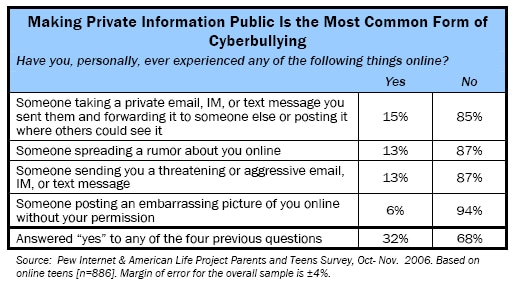
JUNE 27, 2007
Cyberbullying BY AMANDA LENHART One in three online teens have experienced online harassment. Girls are more likely to be victims, but most teens say that they are more likely to be bullied offline than online.About one third (32%) of all teenagers who use the internet say they have been targets of a range of annoying and potentially menacing online activities – such as receiving threatening messages; having their private emails or text messages forwarded without consent; having an embarrassing picture posted without permission; or having rumors about them spread online.
NOVEMBER 9, 2011
Teens, kindness and cruelty on social network sitesHow American teens navigate the new world of digital citizenship BY AMANDA LENHART, MARY MADDEN, AARON SMITH, KRISTEN PURCELL, KATHRYN ZICKUHR AND LEE RAINIE Social media use has become so pervasive in the lives of American teens that having a presence on a social network site is almost synonymous with being online. Fully 95% of all teens ages 12-17 are now online and 80% of those online teens are users of social media sites.1 Many log on daily to their social network pages and these have become spaces where much of the social activity of teen life is echoed and amplified—in both good and bad ways.
Abbreviations.com
Texting AbbreviationsBrowse 1,321 acronyms and abbreviations related to the Texting terminology and jargon.
Navigating Teen Life: Social Media Safety
If you’re on social media, your information might be more public than you think—even if your profiles are set to private. Our teen ambassadors talk through some useful safety tips you can put to use for your social media accounts. Navigating Teen Life doesn’t stop here! Subscribe to our channel for more videos like this. Plus, follow us on Insta and find a ton of resources on our Navigating Teen Life page.
Social Networking for Teens. With the popularity of social networking sites among youth, one of the issues of great concern is how to keep under-age users off of ...
Discusses strategies for teens to use their favorite social media apps responsibly and ... Keywords: safe, social media, social networking, smart, apps, teens, tips.
| ||||||||||||||
Social Media
Schools
Edutopia: Social Media: Making Connections Through TwitterAt Albemarle County Public Schools, teachers use social media to get ideas for their classroom, for professional development, and to connect student learning to the real world.
Incorporating & accounting for Social Media in Education | Harry Dyer | TEDxNorwichED
Harry discusses how the study of Social Media can help us better understand how youth are acting and interacting both online and offline, how young people adeptly navigate a growing and increasingly diverse assortment of social media, and how we can (and must) incorporate and account for social media in the classroom. Against the many calls and social panics insisting that we tell children to ‘disconnect’ from technology. Harry calls for an acceptance of the reality of Social Media and the inextricably enmeshed nature of the online and offline. He highlights the increasingly important and positive role it plays in young people’s lives, how we can better understand Social Media and young people’s relationship with it, and how we can incorporate and utilise their Social Media skills in education. Harry is a Digital Sociologist at the University of East Anglia, who achieved a scholarship to complete his Masters in Social Science Research Methods. He was then granted scholarship funding for his ongoing PhD under the supervision of Professor Victoria Carrington. His research focuses upon identity formation and performance in online Social Networking Sites. Using Actor-Network Theory along with ideas drawn from multi-disciplinary backgrounds such as Comic Book Studies, his research aims to explore how technology and site design can shape and affect the creation and maintenance of identities across a wide range of technologies and Social Networking Sites. This talk was given at a TEDx event using the TED conference format but independently organized by a local community. Learn more at http://ted.com/tedx
|
Edutopia: Mimi Ito on Learning in Social Media Spaces (Big Thinkers Series)Mimi Ito, an expert in young people's use of digital media, shares her research on informal learning in online communities, where students can build technology skills, learn media literacy, and create and share their work. More resources at http://www.edutopia.org/mimi-ito-soci...
Schools are watching students' social media, raising questions about free speech
As universities have started paying close attention to the internet presence of prospective students, high schools have also begun cracking down, sometimes hiring outside companies to police social media posts for bullying or abusive language. But monitoring raises other problems, and civil rights groups are paying attention. Special correspondent Lisa Stark of Education Week reports.
SHOW LESS CA school tracks students' social media: Is it legal?
The social media sites of all 13,000 students in Glendale, Calif.'s middle and high schools are now being monitored by a company called "Geo Listening." School officials hired the company to monitor students' comments so they can intervene when students discuss suicide, bullying, violence or substance abuse. John Blackstone reports.
Understanding your students' social media lives is essential. ... to say that social media has a positive rather than a negative effect on how they feel ... When we confiscate students' devices at school, or when conflicts on social ...
|
Social Media
Impact on Society
TEDx - How social media makes us unsocial | Allison GrahamThis talk was given at a local TEDx event, produced independently of the TED Conferences. Social Media historian Allison Graham offers a witty and ironic view of a society that feels alone together despite the hundreds of virtual connections we have online. With a global population growing up via Facebook and Twitter and a perceptible shift in human interpersonal connections, the constant need for social self-validation permeates our daily existence. This talk shares the funny and revealing insights of a life lived online and how social media is used to connect and disconnect us.
Generation #fail: Social media addicts are more likely to feel inadequate when it comes to their careers and looks
Read more: www.dailymail.co.uk/sciencetech/article-3192512/Generation-fail-Social-media-addicts-likely-feel-like-failures-comes-careers-looks.html#ixzz3jqDH4LaR Follow us: @MailOnline on Twitter | DailyMail on Facebook Jaron Lanier interview on how social media ruins your life
Jaron Lanier, the Silicone Valley ‘computer philosopher', thinks social media is ruining your life.
This Is How Social Media Is Destroying Your Life - The Fake Reality
One of the most important videos I've made. After everything that happened to me in the past 2 years, I wanted to touch on an important subject. Social media isn't evil by itself, but it's fake and we need to open our eyes and realize that. The lives people share on social media, don't reflect the reality they live in. After the privacy crisis in the past year, Mark Zuckerberg had to speak in front of congress. Social media effects on your mental health are scary and we need to do something about it. #depression #socialmedia #facebook
FOMO: Our Relationship with Social Media
FOMO, or fear of missing out, is the anxiety we experience when we feel there’s something exciting happening elsewhere... and we’re not a part of it. It’s been around for awhile but these days, it’s usually triggered by social media. We have instant access to our friends’ activity. That can be a good thing but it makes it all too easy for us to compare our lives to theirs. This leads to us second-guessing our decisions and feeling generally insecure. It can even get to the point where there’s a looming sense of FOMO even when we’re not online. What you might not realize is that the people you’re comparing yourself to are also experiencing this same FOMO… Watch our video to learn more about FOMO and how to cope with it. We hope you enjoy! Thanks for watching, and be sure to subscribe to our channel! http://bit.ly/2qaNzIj
|
How social media creates a better world: Jan Rezab at TEDxSSE
As a child of the formerly communist Czech Republic, Jan Rezab has a unique appreciation for social media, which he works with everyday as the CEO of one of the world's leading social media analysis firms. In this insightful talk, Jan discusses what he believes social media is and isn't, and shares his vision for the future of this powerful tool. About TEDx, x = independently organized event
Facebook Fearless: How social media can be good for you | Tracy Alloway | TEDxJacksonville
The ubiquitous use of social media has caused many to fear that these personalized technology platforms are creating a generation that is narcissistic and self-obsessed. But before we dismiss personalized technology as the perpetrator of our current societal ills, Professor Alloway argues that we must take a closer look at how social media can improve not only our memory of events, but also the way in which we observe our own lives and relate to those around us. Dr. Tracy Packiam Alloway is a psychology professor and the Graduate Program Director at the University of North Florida. She was awarded an Outstanding Undergraduate Teaching Award in 2015 as well as an Outstanding International Leadership Award in 2014. She was also the recipient of the prestigious Joseph Lister Award for outstanding skills in communicating to a non-specialist audience from the British Science Association. Tracy’s research has contributed to the scientific understanding of working memory, and specifically in relation to education and learning needs. She has presented her research to national organizations such as the National Center for Learning Disabilities, and as well as internationally to organizations such as the Japanese Society for Developmental Psychology and the Center on Research on Individual Development and Adaptive Education of Children at Risk in Germany, among others. This talk was given at a TEDx event using the TED conference format but independently organized by a local community. Learn more at http://ted.com/tedx
Ten Arguments for Deleting Your Social Media Accounts Right Now
|
